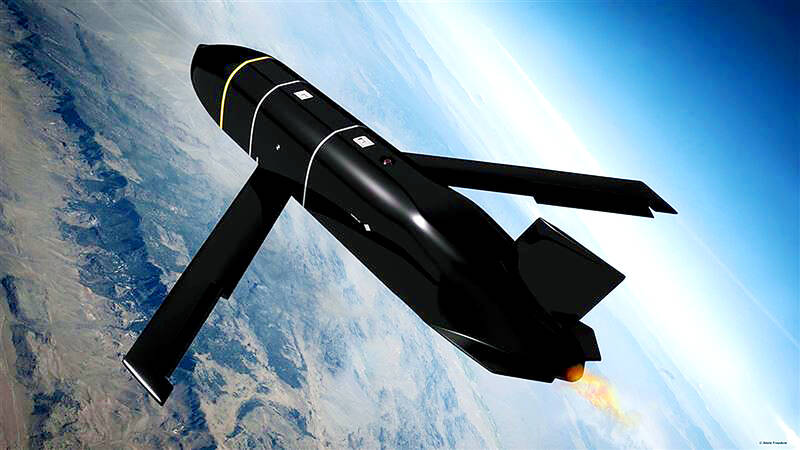Washington is evaluating a transfer of weapons systems requested by Taiwan, according to a copy of a report by the Ministry of National Defense (MND) that is to be submitted to lawmakers tomorrow.
Asked whether the AGM-158 Joint Air-to-Surface Standoff Missile would be among the weapons systems, the ministry refused to comment, but said that it would not rule out announcing the specifics later this year.
The ministry’s domestically sourced high-priority military investments include submarines, next-generation light frigates, rescue ships, advanced trainer jets and infantry fighting vehicles, the report said.

Photo: screen grab from the Web site of the US Air Force
Planned deals include F-16A and F-16B jet performance upgrades, navigation and targeting pods, precision-guided munitions, High Mobility Artillery Rocket Systems (known as HIMARS), Harpoon coastal defense missile systems and MQ-9B drones, it said.
Last year, the ministry told Chinese-language media that it expressed interest in US-made AGM-158 missiles, which can be launched from jets and have a range of 370km.
The US probably had concerns that the transfer of long-range weapons could provoke China, Su Tzu-yun (蘇紫雲), a research analyst at the Institute for National Defense and Security Research, told the Liberty Times (the Taipei Times’ sister newspaper).
However, China’s increasingly mature aircraft carriers and amphibious assault ships pose a growing security threat, helping Taipei make the case for obtaining the missiles, he said.
Aegis Combat System-equipped warships, precision-guided munitions and stealth technologies might become necessary for Taiwan’s defense, and the ministry should consider requesting them, he said.
Meanwhile, the navy is on track to procure nine more Tuo Chiang-class corvettes, so that it would have 12 warships of that class by 2026, the report said.
The shipbuilding project is funded via the Sea and Air Combat Power Improvement Special Budget of NT$236.9 billion (US$7.46 billion), it said, adding that the remaining 10 ships on the order would cost more than NT$69.2 billion.
The class’ lead ship, the ROCS Tuo Chiang, has been in service since 2014, while the second ship, the ROCS Fu Chiang, was christened on Sept. 21 following significant design changes that increased the class’ tonnage and capabilities.
Tuo Chiang-class corvettes built after the improvements have a displacement of 685 tonnes, and can carry 16 Hai Chien II air defense missiles, eight Hisung Feng II and four Hsiung Feng III anti-ship missiles. Each corvette requires an estimated 17 months to build.
The contract to construct the ships was awarded to Lungteh Shipbuilding Co (龍德造船).

Right-wing political scientist Laura Fernandez on Sunday won Costa Rica’s presidential election by a landslide, after promising to crack down on rising violence linked to the cocaine trade. Fernandez’s nearest rival, economist Alvaro Ramos, conceded defeat as results showed the ruling party far exceeding the threshold of 40 percent needed to avoid a runoff. With 94 percent of polling stations counted, the political heir of outgoing Costa Rican President Rodrigo Chaves had captured 48.3 percent of the vote compared with Ramos’ 33.4 percent, the Supreme Electoral Tribunal said. As soon as the first results were announced, members of Fernandez’s Sovereign People’s Party

MORE RESPONSIBILITY: Draftees would be expected to fight alongside professional soldiers, likely requiring the transformation of some training brigades into combat units The armed forces are to start incorporating new conscripts into combined arms brigades this year to enhance combat readiness, the Executive Yuan’s latest policy report said. The new policy would affect Taiwanese men entering the military for their compulsory service, which was extended to one year under reforms by then-president Tsai Ing-wen (蔡英文) in 2022. The conscripts would be trained to operate machine guns, uncrewed aerial vehicles, anti-tank guided missile launchers and Stinger air defense systems, the report said, adding that the basic training would be lengthened to eight weeks. After basic training, conscripts would be sorted into infantry battalions that would take

GROWING AMBITIONS: The scale and tempo of the operations show that the Strait has become the core theater for China to expand its security interests, the report said Chinese military aircraft incursions around Taiwan have surged nearly 15-fold over the past five years, according to a report released yesterday by the Democratic Progressive Party’s (DPP) Department of China Affairs. Sorties in the Taiwan Strait were previously irregular, totaling 380 in 2020, but have since evolved into routine operations, the report showed. “This demonstrates that the Taiwan Strait has become both the starting point and testing ground for Beijing’s expansionist ambitions,” it said. Driven by military expansionism, China is systematically pursuing actions aimed at altering the regional “status quo,” the department said, adding that Taiwan represents the most critical link in China’s

‘REALLY PROUD’: Nvidia would not be possible without Taiwan, Huang said, adding that TSMC would be increasing its capacity by 100 percent Nvidia Corp CEO Jensen Huang (黃仁勳) on Saturday praised and lightly cajoled his major Taiwanese suppliers to produce more to help power strong demand for artificial intelligence (AI), capping a visit to the country of his birth, where he has been mobbed by adoring fans at every step. Speaking at an impromptu press conference in the rain outside a Taipei restaurant, where he had hosted suppliers for a “trillion-dollar dinner,” named after the market capitalization of those firms attending, Huang said this would be another good year for business. “TSMC needs to work very hard this year because I need a lot